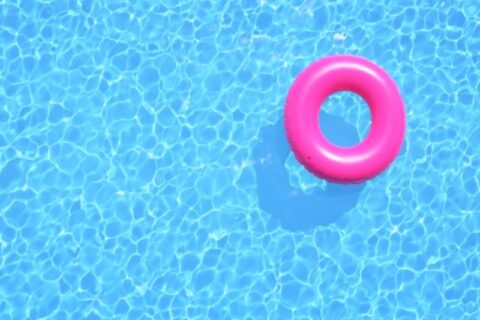Is Green Pool Water Safe for Swimming?
There’s nothing quite as refreshing as diving into your own, sparkling, blue pool water, but nothing stops you in your tracks faster than green pool water. In horror, you wonder, “Why is my pool water green?” Is it safe to swim? The answer to that is probably not. Green pool water is the result of an imbalance, and it’s wise to figure out exactly what’s out of balance before you consider taking a dip.
- The most common cause of green pool water is algae. Most of the time, algae growth is kept at bay by the water’s movement and the chemicals in the pool. When something is off, though, and algae bloom can happen very quickly. A drop in chlorine levels, heavy rains, high temperatures, and a lack of circulation can all allow algae to grow in a pool. When this happens, it’s not safe to swim. You might not think of algae as a health hazard, since it can be found in natural bodies of water where people swim, but the algae in a swimming pool is highly concentrated and can be dangerous. What’s more, the bacteria that feed on algae can cause skin infections and other types of illness.
- Metals and pollens can also change the hue of your pool. The yellow of pollen, mixed with the blue of the water, can cause a green effect. Oxidation of metals in the pool, like the ladders and pump elements, can release material that shifts the pool’s chemical balance and turns the water green. In this case, you might notice that the pool water looks green but clear.
- Chlorine may be the key to fixing your problem. When chlorine levels are too low, algae can begin to take over. When there’s too much chlorine, though, it can cause metals to oxidize. If algae growth is your problem, you might find that shocking the pool brings the chlorine levels up and clears the water. If the chlorine level is too high, leaving the cover off and letting the sun shine on the pool can sometimes reduce your chlorine. If you can’t seem to get your chlorine levels right, it may be time to call in a professional to help you maintain your pool.
- Check the pH if your pool is green. The pH of a pool is the measurement of its alkalinity or acidity. Pool water should be neutral, and if it gets too high it can prevent chlorine from doing its job. You may need to use a pH reducer to bring it down to the right level and clear up your problem.
- In some cases, your pool filter may be the issue. If the filter isn’t working well, it won’t remove algae and pollen from the water. You may need to run it for longer stretches, clean it, or change it. IF these measures don’t fix the problem, your filter and pump may need to be replaced.
When you need someone to keep your pool clean and sparkling blue, Millennium Pools and Spas can help. With over 30 combined years of experience in the pool industry, we provide a comprehensive range of pool services for both residential and commercial customers in Virginia, Washington DC, and Maryland. When you hire Millennium Pool Service, you get a well-qualified, industry-trained staff of pool contractors and technicians, services that are tailored to your needs, and a commitment to 100% customer satisfaction. Contact us for more information.


